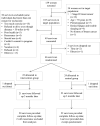Biobehavioral factors mediate exercise effects on fatigue in breast cancer survivors
- PMID: 24212124
- PMCID: PMC4435796
- DOI: 10.1249/MSS.0000000000000210
Biobehavioral factors mediate exercise effects on fatigue in breast cancer survivors
Abstract
Purpose: This study aimed to examine mediators of fatigue response to an exercise intervention for breast cancer survivors in a pilot randomized controlled trial.
Methods: Postmenopausal breast cancer survivors (n = 46; ≤stage 2), off primary treatment, and reporting fatigue and/or sleep dysfunction were randomized to a 3-month exercise intervention (160 min·wk of moderate-intensity aerobic walking, twice weekly resistance training with resistance bands) or control group. Six discussion group sessions provided behavioral support to improve adherence. Fatigue, serum cytokines, accelerometer physical activity, cardiorespiratory fitness, sleep dysfunction, and psychosocial factors were assessed at baseline and 3 months.
Results: The exercise intervention effect sizes for fatigue were as follows: fatigue intensity d = 0.30 (P = 0.34), interference d = -0.38 (P = 0.22), and general fatigue d = -0.49 (P = 0.13). Using the Freedman-Schatzkin difference-in-coefficients tests, increase in fatigue intensity was significantly mediated by interleukin 6 (IL-6) (82%), IL-10 (94%), IL-6/IL-10 (49%), and tumor necrosis factor-α (TNF-α):IL-10 (78%) with reduced sleep dysfunction increasing the relationship between intervention and fatigue intensity rather than mediating intervention effects (-88%). Decrease in fatigue interference was mediated by sleep dysfunction (35%), whereas IL-10 and pro-anti-inflammatory cytokine ratios increased the relationship between intervention and interference (-25% to -40%). The reduction in general fatigue was significantly mediated by minutes of physical activity (76%), sleep dysfunction (45%), and physical activity enjoyment (40%), with IL-10 (-40%) and IL-6/IL-10 (-11%) increasing the intervention-fatigue relationship. In the intervention group, higher baseline fatigue, anxiety, depression, and perceived exercise barrier interference predicted a greater decline in fatigue interference and/or general fatigue during the intervention.
Conclusions: Biobehavioral factors mediated and enhanced intervention effects on fatigue, whereas psychosocial factors predicted fatigue response. Further study is warranted to confirm our results and to improve understanding of relationships that mediate and strengthen the intervention-fatigue association.
Trial registration: ClinicalTrials.gov NCT01147367.
Figures
References
-
- Al-Majid S, Gray DP. A biobehavioral model for the study of exercise interventions in cancer-related fatigue. Biological research for nursing. 2009;10(4):381–91. - PubMed
-
- Berger AM, Gerber LH, Mayer DK. Cancer-related fatigue: implications for breast cancer survivors. Cancer. 2012;118(8 Suppl):2261–9. - PubMed
-
- Bruunsgaard H. Physical activity and modulation of systemic low-level inflammation. J Leukoc Biol. 2005;78(4):819–35. - PubMed
-
- Buffart LM, De Backer IC, Schep G, Vreugdenhil A, Brug J, Chinapaw MJ. Fatigue mediates the relationship between physical fitness and quality of life in cancer survivors. J Sci Med Sport. 2013;16(2):99–104. - PubMed
-
- Buysse DJ, Reynolds CF, 3rd, Monk TH, Berman SR, Kupfer DJ. The Pittsburgh Sleep Quality Index: a new instrument for psychiatric practice and research. Psychiatry Res. 1989;28(2):193–213. - PubMed
Publication types
MeSH terms
Substances
Associated data
Grants and funding
LinkOut - more resources
Full Text Sources
Other Literature Sources
Medical



